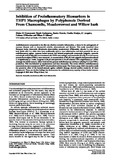| dc.description.abstract | Antiinflammatory compounds in the diet can alleviate excessive in flammation, a factor in the pathogenesis of common diseases such as rheumatoid arthritis, atherosclerosis and diabetes. This study examined three European herbs, chamomile (Matricaria chamomilla), meadowsweet (Filipendula ulmaria L.) and willow bark (Salix alba L.), which have been traditionally used to treat in flammation and their potential for use as antiin flammatory agents. Aqueous herbal extracts and isolated polyphenolic compounds (apigenin, quercetin and salicylic acid, 0–100m M) were incubated with THP1 macrophages, and interleukin (IL)-1b, IL-6 and tumournecrosis factor-alpha (TNF-a) were measured. At concentrations of 10m M, both apigenin and quercetin reduced IL-6 significantly (p<0.05). Apigenin at 10m M and quercetin at 25m M reduced TNF-asignificantly (p<0.05). Amongst the herbal extracts, willow bark had the greatest antiinflammatory activity at reducing IL-6 and TNF-a production. This was followed by meadowsweet and then chamomile. The lowest effective antiinflammatory concentrations were noncytotoxic (MTT mitochondrial activity assay). The Comet assay, which was used to study the protective effect of the isolated phenols against oxidative damage, showed positive results for all three
polyphenols. These are the first findings that demonstrate the antiinflammatory capacity of these herbal extracts. | en_US |

